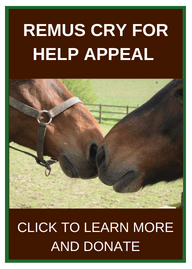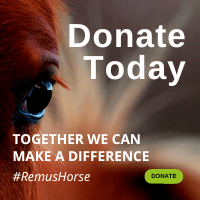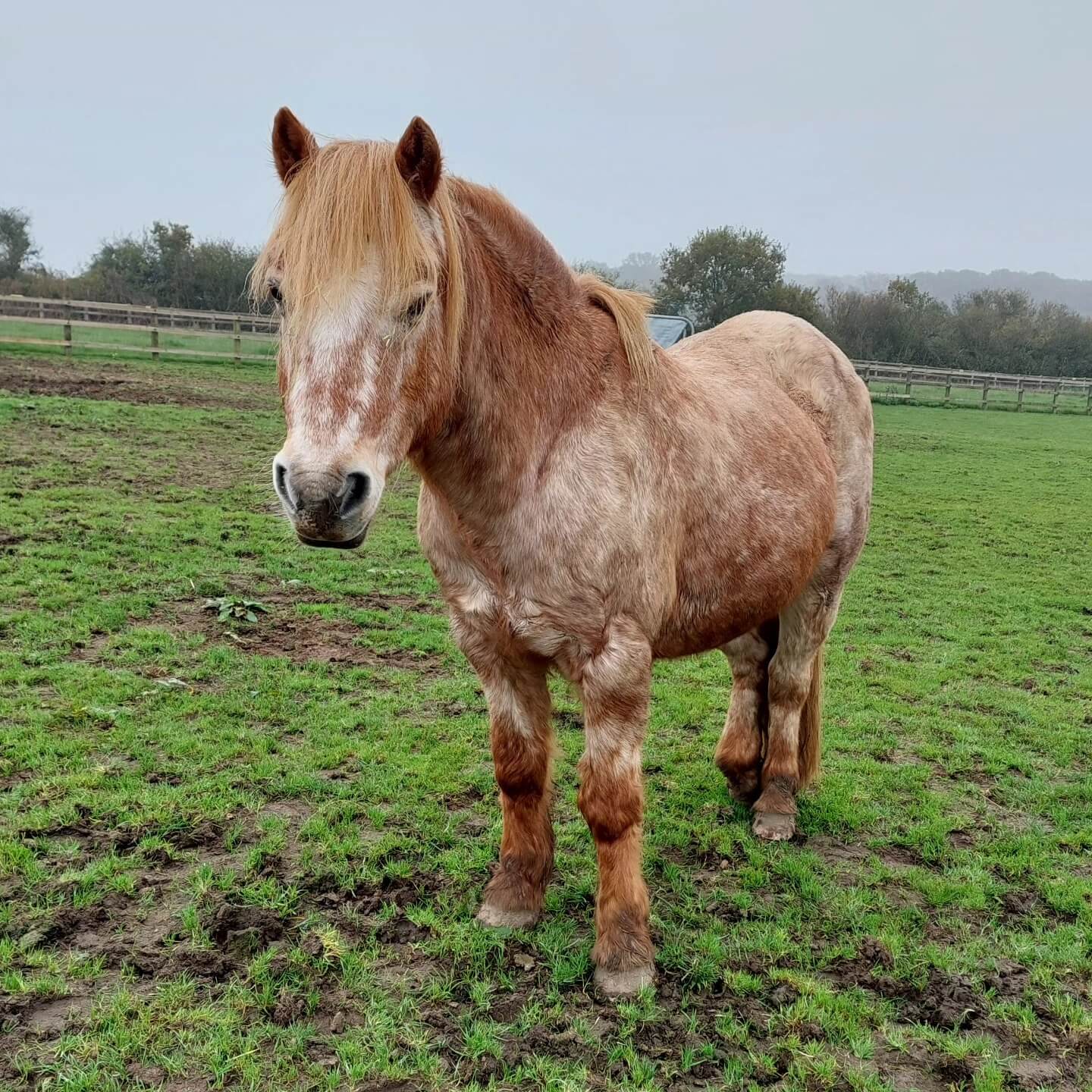
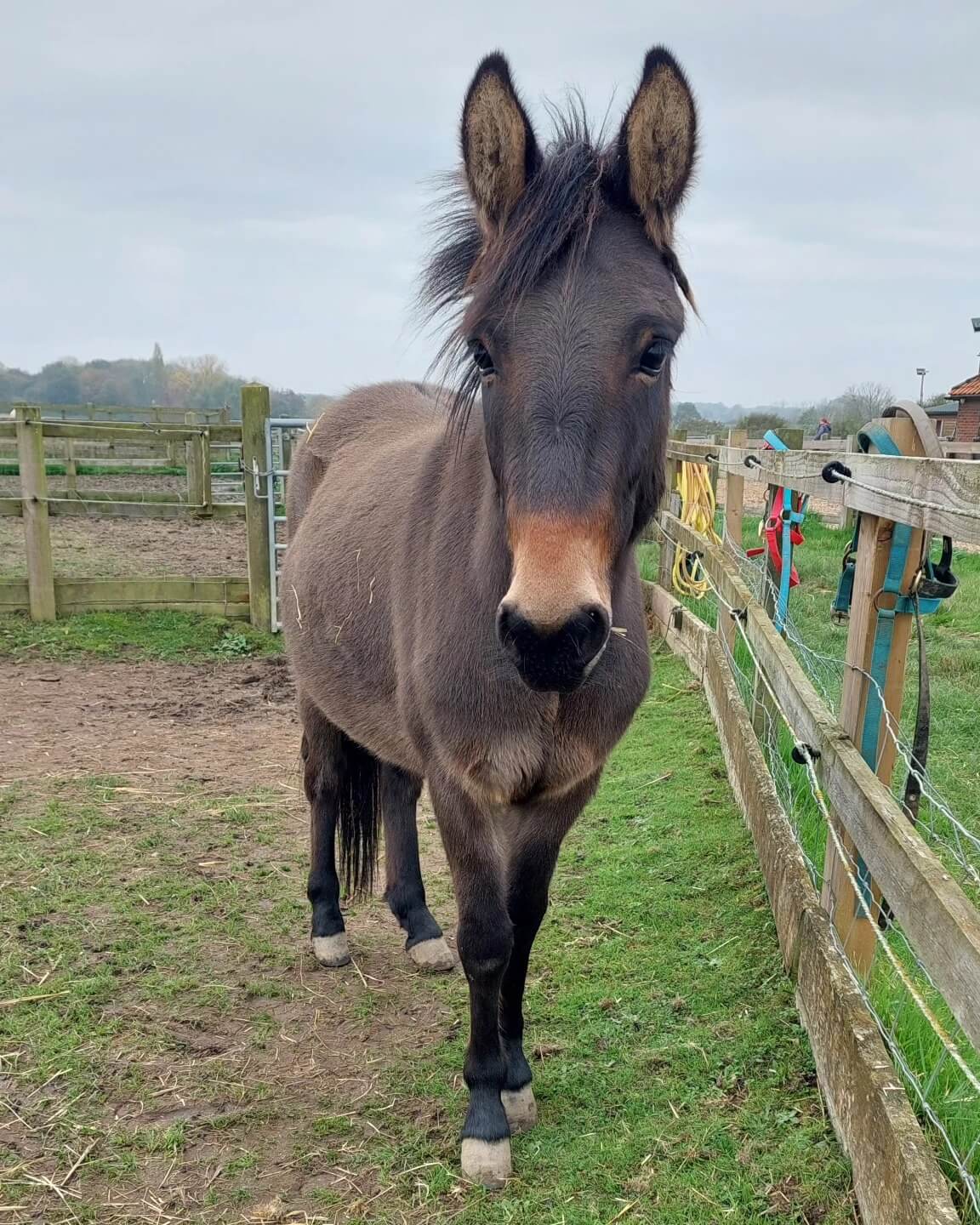
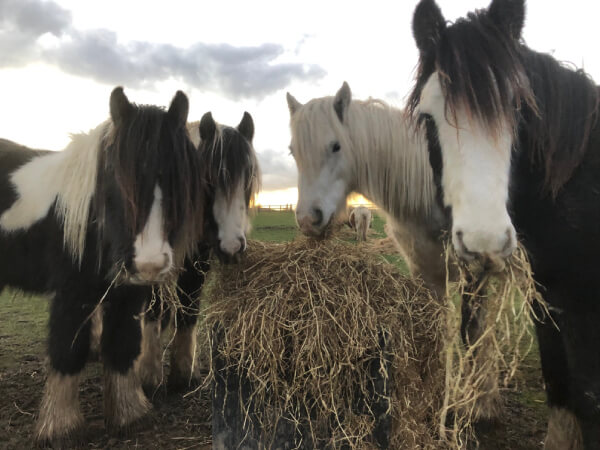
Looking After your Stabled Horses and Ponies in Winter
Bad weather and flood conditions can result in your animals being stuck in their indoor stabling for longer than usual – here’s how to keep them healthy…
Following a very wet autumn, and now winter, having safe and suitable turnout for your animals may be a luxury for many.
Wet weather often affects us here at Remus with both flooding across the lower paddocks and at Buttsbury Ford, but when your horse has to be stabled for longer than you’d planned for, it’s important to ensure you are doing everything you can to keep them healthy and happy.
If your horse is kept in a large yard or livery, you may be lucky enough to have an all-weather turnout area – whether indoor or outdoor, with rubber, sand or woodchip, which allows your animals to exercise when ground conditions in fields are bad.
Track systems are also more popular now and can be useful for older horses and those recuperating as they can continually move.
However, for many horse owners, these aren’t options, so if your horse is stabled for longer than usual. consider these points:
- Routine: Horses thrive on consistency, but if you have to stable your horse you’ll need to offer a different kind of routine to stop them becoming bored and even confused. Visit at the same time to give feed, forage and top up water. And ensure they have some human interaction, such as daily grooming.
- Stable toys: When your animals are in stables for a long period of time, they can get bored and turn to attention-seeking vices. Stable toys can help – whether it’s treat balls or a swede strung up for them to nibble at. If possible, place your animal next to others, so they have some company, but otherwise consider a stable mirror.
- Exercise: If ground conditions make it hard to ride, consider long lining or lunging for a short but effective workout.
- Keep it clean: Cleanliness is even more important than usual. Make sure hoof care and grooming are included in your routine and maybe consider having less bedding during the day to help keep the stable clean – subject to how cold it is of course.
- Food rations: Carefully consider how much food and forage they are receiving if they are not getting as much exercise as usual. Reduce calorie and sugar content and offer good-quality forage.
You can view one of the Donkey gang, Davey, playing with a treat ball on our YouTube channel here: youtu.be/LiAO_95stvQ.
Find more advice and ideas at: everythinghorseuk.co.uk/considering-welfare-for-the-stabled-horse-and-pony-this-winter.
And please remember our winter appeal. If you’ve not yet had chance to donate, we would very much appreciate your help: www.justgiving.com/campaign/remuswinterappeal2024. However large or small, every contribution makes a difference.
Winter Feeding for a Calm and Healthy Horse
Winter isn’t without its challenges, and this includes keeping your horse healthy, happy and looking their best. Inevitably shorter days and dismal weather can mean reduced turnout, irregular exercise and less hacking opportunities to blow the cobwebs away. Feeding plenty of forage to keep the horse occupied when stabled for longer also means keeping an eye on your horse’s waistline.
Fibre and oil for a calm ride
For a calmer ride research has shown that feeding sources of slow-release energy from fibre and oil is key. Using a feed that supplies an appropriate amount of energy for a reduced workload will not only help with a calmer ride but also help to keep the waistline in check as well.
Dengie Hi-Fi Molasses Free combines chopped and pelleted alfalfa and straw with a light rapeseed oil coating, mint, and fenugreek for added tastiness. Hi-Fi Molasses Free contains very low levels of energy, sugar and starch making it ideal for horses at rest or in light work that need to watch their weight or can be excitable. Simply combine with vitamins and minerals to balance the ration.
Maintaining skin, coat and hoof condition
UK pasture and forage typically lacks the trace minerals copper, selenium and zinc and conserved forage also lacks vitamin E. Ensuring a balanced ration and adding some extra beneficial nutrients such as biotin can help with the environmental challenges to your horse’s skin, coat and hooves in the winter.
Healthy Hooves Molasses Free combines chopped and pelleted alfalfa and straw with a light rapeseed oil coating, vitamins, minerals, garlic and MSM. Healthy Hooves Molasses Free provides a balanced ration when fed at the recommended quantity and includes biotin at the level found in a hoof supplement. MSM, which is a bio-available source of sulphur, is also included as it is a key component of keratin for joint support as well as good hoof, coat and skin condition. Grass is the natural source of sulphur for horses and those on restricted grazing may benefit.
Managing weight and digestive health
We all know that trickle feeding is vital for digestive and behavioural health but in the domestic environment ad-lib forage feeding can often result in obesity. Choosing low calorie fibre sources is key for weight management and keeping the horse chewing.
New Dengie Ulser Lite combines oat straw with dried grasses, grass and alfalfa pellets with a light rapeseed oil coating, ADM Protexin in-feed formula, that combines prebiotic and live yeast, and herbal blend. At 8MJ/kg Digestible Energy Ulser Lite is a low-calorie fibre feed to support digestive health that can also be used to partially or totally replace the forage ration making it an ideal alternative when only more calorific forage like haylage is available.
Straw – a low calorie fibre source
Winter weight loss in good do-ers or overweight horses is a vital step to getting them to or keeping them at a healthy weight long term. In the UK our conserved forages such as hay and haylage can be too calorific when fed ad-lib and straw as a lower calorie fibre can be very useful to mix in the forage ration to keep a horse chewing without the calories. Some people are nervous regarding straw use, but research using straw to replace 50% of the haylage ration found no detrimental effects on digestive health. Furthermore, it helped to slow the overall rate of intake of the total forage ration which in turn lessened insulin response which is good news for those with insulin dysregulation.
Discover more at www.dengie.com.
The Best Things about Riding in Winter
The nights are dark and it’s cold and damp – but never fear, there are plenty of things to love about being a horse owner in winter!
It may be hard to get yourself up and out when it’s colder and dark, but there’s an upside to making the effort. Winter mornings can be crisp and fresh, so get to the yard and get all the jobs done early and you might be able to squeeze in a ride before you have to be at your desk – it makes a great way to start off the weekend, too.
And daytime/evening rides can be more fun too. Summer riding is lovely, but often you both end up feeling hot and sweaty and bothered by flies. Plan ahead, check the weather and make the most of the good riding conditions ahead.
If you’re a competition rider, there may be fewer events, so make the most of the ones that are happening – and look out for a host of training opportunities including clinics, demos and trainer lessons.
Finally, if you’re finding yourself with more time on your hands, take the opportunity to get to all those jobs that get neglected when you’re busy riding. Tack and feed rooms can benefit from a clearout at this time of year – rope in some friends to make it more fun!
For more benefits of winter riding head to: www.horseandrideruk.com/news/eight-ways-riders-can-embrace-the-clocks-going-back-for-winter/.
If you haven’t already done so, please check out our appeal to help raise funds to replace our perimeter fencing.
By the way, you might like to note that this year we’re celebrating our 40 year anniversary! More on that to follow in due course.
Winter Coughs and What to Look Out For
Winter often brings with it its fair share of coughs and colds, even without an international pandemic! But it’s not just the NHS under pressure. Studies have shown that the cold air and dark nights also have an impact on the health of our four-legged friends. With an increased risk of horses developing respiratory issues throughout the winter months, there are a few things you can do to help ward-off coughs and act quickly if more significant problems occur.
Environment is a huge factor. Whilst it might be tempting to warm up the stable and create a cosy sanctuary, ventilation is key! Increasing turnout time and ensuring good air circulation in your stable can counteract the effects of altered air hygiene, caused by the winter months. Low-level feeding and soaking or steaming your feed are also great ways of preventing dust and spore inhalation.
But a dust-aggravated cough is different from a virus. In fact, there are four different causes of equine respiratory issues: fungus spores, allergens and contaminants, bacteria, and viruses. Often, the increased time indoors gives infections the opportunity to spread around the yard. If you suspect your horse might be affected by something more than dust inhalation, you should cease ridden exercise, increase turnout, and contact your vet immediately. Your vet will be able to conduct a number of tests to help diagnose the issue.
You can read more about the causes of equine coughs, and what to do if your horse has symptoms on this Horse and Rider article here.
Our online shop has a number of new items for Christmas 2021 including, of course our new wall calendar for 2022 which features unique images of our animals throughout the 12 months. Visit our online shop.
Turn up the Turnout
With the long nights drawing in, and a sudden shift to the colder weather, it’s easy to see how we might be tempted to reduce turnout time for our beloved horses and ponies – particularly in favour of a warm and cosy stable! But a recent study has shown that longer turnout could actually reduce the risk of equine injury.
The benefits of turnout have long been recognised. Not only does the constant roaming contribute to good health and fitness, excellent circulation, and reduce the risk of Colic, but the companionship associated with being outdoors and part of a herd is said to prevent boredom and reduce stress-related behaviour.
Our Remus residents spend much of their days wandering the pastures with their pals, as well as being supported by our environmental enrichment programme. We have always recognised the importance of providing our horses with the opportunity to behave as naturally as possible.
But now a six-year study from Centenary University Equestrian Center in New Jersey, has shown that horses turned-out for more than 12 hours per day, had a massive 25% lower instance of soft tissue injuries. The research across 146 non-elite performance horses was inspired by the lead researcher’s own veterinary practice observations. Jesslyn Bryk-Lucy noticed that horses who had a more natural, outdoor lifestyle seemed to require less veterinary care.
Scientists believe there could be a number of reasons behind the findings of this research. Horses may have benefited from increased conditioning of the tendons and ligaments from simply being in a more natural environment, or it could be related to change in behaviour caused by longer turnout.
There is undoubtedly further research to be done in this area, but this study goes one step further in demonstrating that horses are happiest and healthiest outdoors!
You can read more about the findings on Horse & Hound here.
As you can imagine, our costs for the animals increase significantly during the winter. If you are able to make a donation or perhaps purchase a treat for one of them, it would be massively appreciated!
Coping with fireworks
For any horse owner, Fireworks Night is a worry. However, celebrations now tend to go on for two or even three weeks and are certainly not restricted to the one night. Here at Remus, our residents are kept as calm as possible during any nearby displays. They’re no doubt helped by the holistic care and therapies we provide all year round, but of course nothing can really prepare any animal for the noise or flashing lights.
Thankfully, following more than 307,000 people signing one petition, change is happening and a report by the Petitions Committee was released on 5th November. This report comes after an inquiry into the impact of fireworks on humans and animals, and calls on the government to limit the number of displays through a system of permits, review noise levels and promote the responsible use of fireworks.
Meanwhile, an owner’s video of a firework display over her stable yard went viral online last week with what she described as sounding like a “war zone”, and there have been other stories in the press of shocking injuries to distressed horses and ponies.
Hopefully for our horses, ponies and all other animals who are affected, change will come. In the meantime, try to keep your horses’ routines as familiar as you can to reduce stress and make sure their stable and field environments are safe. If you know fireworks are going to be set off, you should stay with your horse, but always be aware of your own safety.
You can read more about the Petitions Committee report at: https://www.yourhorse.co.uk/news/articles/bang-out-of-order-rspca-welcomes-new-fireworks-report
The Importance of Winter Turnout
Hartpury College have recently released some research indicating that 20 minutes on a ‘horsewalker’ is equivalent exercise to one hour of turnout. The research showed that the horses travelled the same distance in both scenarios, but the heart rates of the turned-out horses were higher, due to periods of trot and canter.
With winter fast approaching, many horse owners’ thoughts will be turning to the inevitable turnout woes, and ways to get around them!
However, as the researchers were keen to point out, a ‘horsewalker’ is not a replacement for daily turnout. If you’re lucky enough to have one, it simply provides additional exercise during times of limited turnout or limited daylight for ridden exercise.
The psychological benefits of being out in the field, at least for part of the day, are huge. Here at Remus our horses enjoy daily turnout, as well as environmental enrichment to enhance their physical, social and mental environment. This is through various means including music, mirrors, toys and, of course, regular grooming. You can read more on our enrichment programme here.
Turnout is also important to allow horses to behave as naturally as possible in social groups. All of our residents love spending time with their pals out in the field – come rain or shine!
You can read more about the research in this recent Horse & Hound article.
Our last Open Day of the 2019 season will be taking place on Sunday 6 October. This is the last time that we will be open to visitors this year, so don’t miss out! You can find all the information you need on our website.
Snug as a bug?
There has been a lot of talk and debate online over the last few months about rugging our horses. Some think horses should be kept naturally while others wouldn’t dream of not using a rug, but for many owners it causes a daily headache and unwanted addiction to our preferred weather app! The general consensus is that we will do what is best for our own horses, but do we fully consider all of the contributing factors?
With milder winters (last year’s Beast from the East excluded!) and different daily routines for different horses, there is no ‘one size fits all’ approach and the old temptation to dig out the heavyweight in December and leave him in it until March will not do!
This article from Horse & Hound helpfully sets out all the main points that owners need to consider. It suggests that “most horses will not need rugging until temperatures dip to 5-10°C.” Of course, older horses like we have here at Remus may need rugging sooner to help them keep warm, while those suffering from conditions such as Cushings will get too hot in the lightest of rugs due to their very thick coats.
Whilst we’re talking about keeping horses warm, please do take a look at our Winter Feed Appeal. Your support would be greatly appreciated!
Caring for your Horse this Winter
We’ve been seeing some gloriously sunny days with a bright blue sky, but it does mean that the ground is hard and the temperature extremely cold. As a result, we’ve put together a few tips to ensure you and your horse are as warm and as safe as possible.
Winter Prevention Measures
- If you haven’t already, lag your pipes to help prevent freezing.
- Remember to drain pipes and hosepipes at the end of each day.
- Put a ball or similar in the water troughs to prevent them freezing over.
- Buy in extra hay and feed in case you cannot get supplies due to heavy snowfall.
- Stock up on grit – always carry some in your car in case you need it – but ensure it’s in a sealed container as it is corrosive.
- Keep antifreeze and WD-40 in your car too.
- In case of snow carry a blanket, torch and shovel and ensure your mobile phone always has some charge on it.
Safety
- Be aware of ice – do grit where possible or put down used straw to make a safe path for you and you horse.
- Be aware of the risks of heaters and especially of putting clothing over them – whilst we are all trying to dry our gloves and socks and dry out our horse’s rugs we put ourselves at risk of fire. Its best not to dry or warm anything over an open flame and never leave clothing unattended on a heater.
Warmth
- In winter, keep your horse as warm as it needs to be using rugs, stable bandages and deep beds.
- If your horse is living out make sure there’s a deep bed in the shelter and plenty of hay for him or her to eat. Remember that a horse uses food to provide inner warmth.
Water
- Ensure you break the ice on your horses’ water supply, if you haven’t added a ball or something to the surface as we mention above, so that it can get to fresh water, and bring in hoses if necessary.
- Your horse is more prone to impaction colic in this weather, so you might like to consider adding some warm water to its feed to ensure it takes in enough water to optimise gut mobility.
Food in the Winter
- Try to warm food before feeding if you are feeding wet products (ie, soaked foods such as sugar beet or mashes) rather then feeding icy cold food. You can do this by just adding warm water – again see above.
Older Horses
- Remember that older horses that are more restricted during the colder wetter weather are also more prone to impaction colic. Because the water is cold they tend to drink less and this also increases the risk, so if you can’t keep the water above freezing then try putting water in their food to ensure that they are getting sufficient fluid intake.
Those less Fortunuate
- Please do keep an eye on any horses near you that aren’t getting the care they should, and either help out as needed or report to one of the welfare groups. We provide more information on Horse Welfare here.
There is no let up in the horse welfare crisis in the UK. Please continue with your support. We can only help these poor animals, if you help us.
Please make your donations to help us to help them here: https://www.remussanctuary.org/donate/. Alternatively you can contribute directly to our winter feed appeal here.
Winter Chill and Caring for your Horse
We’re finally seeing the cold weather we would ordinarily expect for Winter, with probably more to come, here are a few tips to keep yourself safe, make life a little easier and ensure your horse is as warm as can be.
Winter Prevention Measures
- Lag pipes now to help prevent them freezing.
- Remember to drain out pipes and hosepipes at the end of the day.
- Put a ball in the water troughs to prevent them freezing over.
- Buy in extra hay and feed in case you can not get supplies in due to snow.
- Stock up on grit now. Always carry some in your car in case you need it – but ensure it’s in a sealed container as it is corrosive.
- Keep antifreeze and WD-40 in your car.
- In case of snow carry a blanket, torch and shovel and ensure your mobile phone always has some charge on it.
Safety
- Beware the ice – do grit where possible or put down used straw to make a safe walkway for you and you horse
- Beware the risks of heaters and putting clothing etc over them – whilst we are all trying to dry our gloves and socks and dry out our horse’s rugs we put ourselves at more risk of fire. Never dry or warm anything over an open flame and never leave clothing unattended on a heater.
Warmth
- In winter, keep your horse as warm as it needs to be using rugs, stable bandages and deep beds.
- If your horse is living out ensure there is a deep bed in the shelter and plenty of hay for it to eat. Remember a horse uses food to provide inner warmth.
Water
- Ensure you break the ice of your horses’ water supply so that it can get to fresh water. Bring hoses in etc.
- Your horse is more prone to impaction colic in this weather, so why not add some warm water to its feed to ensure it takes in enough water to ensure gut mobility.
Food in the Winter
- Try to warm food before feeding if you are feeding wet products (ie, soaked foods such as sugar beet or mashes) rather then feed icy cold food. You can do this by just adding warm water.
Older Horses
- Remember that older horses that are more restricted during the colder wetter weather are more prone to impaction colic. Because the water is cold they tend to drink less and this also increases the risk, so if you can’t keep the water above freezing then try putting water in their food to ensure that they are getting sufficient fluid intake.
The Less Fortunate Ones
- Please do keep an eye on any horses near you that aren’t getting the care they should, and either help out as needed or report to one of the welfare groups. We provide more information on Horse Welfare here.
There is no let up in the horse welfare crisis in the UK. In fact the RSPCA only reported an increase just a week ago. Please continue with your support. We can only help these poor animals, if you help us.
Please make your donations to help us to help them here: https://www.remussanctuary.org/donate/.

